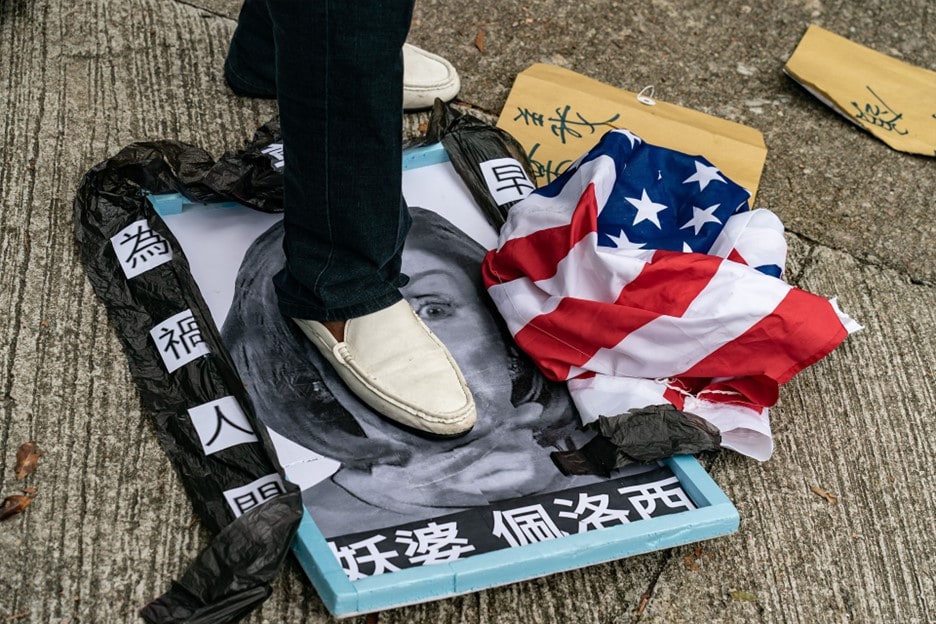Official Russia, not unsurprisingly, harshly condemned the visit by House Speaker Nancy Pelosi to Taiwan as a provocation, but senior Russian foreign policy analysts expressed hope that Pelosi's visit to Taiwan was a game changer that would push China into a firm alliance with Russia where they would have each other's back against the US and its allies. Kommersant's senior foreign correspondent Sergei Strokan's article was titled "Thank You Pelosi". Timofei Bordachev program director of the pro-Kremlin Valdai Discussion Club think tank expressed his hope that China's patience prompted by its dependence on the global economy, had now worn thin, Now China would realize that there wore more important things than economic comfort and would defend the world order against America just as Russia was doing in Ukraine.
A report on Russian reaction to the Pelosi visit follows below:

Anti-Pelosi demonstration in front of US consulate in Hong Kong (Source: Snob.ru)
Presidential Press Secretary Dmitry Peskov condemned the Pelosi visit: "As before, I am not a supporter of throwing loud and terrible words. The level of tension provoked by the visit cannot be underestimated. This is a pure provocation"[1]
Foreign Ministry spokeswoman Maria Zakharova mocked the Pelosi visit as a provocation that was incomprehensible even to the American public:
"Today, we can follow American provocations as they unfold almost live. Last time I checked, hundreds of thousands of people were tracking Nancy Pelosi’s flight path. I do not remember the last time an American politician faced so much mockery and ridicule. People are tracking the flight paths in real time, they compare them against the stated destinations and political declarations, and are asking questions. Everyone is mocking these moves, covering their faces with their hands. The Americans do this because they are ashamed of their leaders. Horrified, they ask each other: 'What if this provocation goes the whole nine yards?' Yesterday, I received questions from US nationals who wrote: 'Can you at least tell us what could happen if this provocation goes all the way?' People are afraid. They understand that what the administration and these political forces are doing is irresponsible, and they understand that there is a lack of coordination in today’s Washington. In fact, no one can understand what they actually want except for these erratic moves to spread chaos everywhere.
"Does this make any sense? Have they calculated their moves? People in the United States and around the world are horrified by the fact that people who are unable to take strategic decisions that would benefit the entire world, and who cannot even explain what they are doing, while engaged in never-ending provocations, staging incidents and spreading chaos, stand at the head of the United States, a nuclear power with a plethora of military bases around the world and nuclear weapons deployed in Europe. For these reasons, we view the possible, eventual and undeclared visit by Speaker of the US House of Representatives Nancy Pelosi to Taiwan as yet another provocation on behalf of the US administration in its effort to add to the pressure it wants to exert on Beijing."[2]
At a press conference during his visit to Myanmar, Foreign Minister Sergey Lavrov joined the condemnations of the Pelosi visit: "I don’t know. I am not going to judge what motivated them. I have no doubt that this reflects the same line that we are discussing as regards the Ukrainian situation – a desire to prove to all and everyone that they can do anything they want with impunity. 'My way or the highway' – this is how it sounds. I don’t see any other reason to create such an irritant out of the blue, being perfectly aware of what this means for the PRC."[3]
If the response by Russian officials was condemnation tinged with bewilderment, two Russian foreign policy analysts considered the Pelosi visit a bonanza for Russia.
Kommersant's Sergei Strokan voiced his expectation that China would now move from rhetorical support for Russia to active measures. He wrote:
"After the start of the special operation in Ukraine, the confrontation between Russia and the United States and NATO became the central nerve of world politics. In this regard, Washington and its allies channeled mammoth efforts to prevent China from becoming Russia's main 'savior' by allowing it to evade sanctions by reorienting its economy from West to East. All measures were employed: they persuaded, beseeched and tried to appease Chinese President Xi Jinping. Finally, they issued prosaic threats, warning of some 'high price' that an obstructive China would have to pay.
"This forced Beijing to demonstrate the magic of a balancing act – while not renouncing cooperation with Moscow, to declare that it does not supply weapons to Russia, does not provide it assistance in the conflict in Ukraine, and in general it favors peace and the resolution of all issues at the negotiating table. Although, it would seem that this is what was stopping it from openly and unambiguously supporting Russia. Indeed, as Chinese Foreign Minister Wang Yi said last year, in Sino-Russian cooperation 'there is no end point, no forbidden zones, no upper limit' and, in general, although this is not an alliance, it is 'more than an alliance.'
"However, despite the vibrant rhetoric, the 'upper limit' was invisibly present. Beijing adhered to the principle of equidistance from the parties to the Ukrainian conflict and, until recently, listened to Kyiv, which called on friendly China to completely abandon interaction with Moscow.
"Another security crisis developing thousands of kilometers away from Ukraine, in the Indo-Pacific theater that centered on the precious territorial, economic and geopolitical asset of Taiwan, remained in the background until this week, because it was not so acute. However, now the situation has reversed itself by 180 degrees.
"Nancy Pelosi's visit to the island, which pushed Ukraine into the background with a powerful information wave, makes Kyiv one of the main losers, while strengthening Moscow's strategic position. After Nancy Pelosi crossed the "red line" in US-China relations, any new claims against China regarding its actions in the Ukrainian crisis become irrelevant. Now Beijing can always answer Washington: what rules of international politics do you adhere to?
"Nancy Pelosi's visit to the island essentially turned the Ukrainian and Taiwan crises into communication vessels. Unsurprisingly, Russian Foreign Minister Sergei Lavrov has already stated that the US position on Taiwan 'reflects the same line that we are talking about regarding the Ukrainian situation.' It emerges that one of Russia's main enemies in Washington, Nancy Pelosi, unwittingly played along with Moscow, demonstrating that Russia and China are indeed sailing in the same boat.
"Now nothing prevents Moscow and Beijing from taking a back-to-back stance, covering each other's rear: Russia is fighting off enemies in the western direction, and China in the Indo-Pacific region. In battle, you need to help each other, because the stronger your comrade in arms, the closer your common victory is. Over whom? Over the USA of course. So, thank you, Pelosi."[4]

Sergei Strokan (Source: Media.az)
Timofei Bordachev believes that the Pelosi visit compels China to make the choice of whether it is willing to abandon hopes of restoring Taiwan to the mainland or whether like Russia, it is willing to fight to secure the world against American thuggishness.
"...Consumption is steadily growing in Chinese society, and these are hundreds of millions of people who want to live better, and for this they have to take away from the United States what they [the US] were accustomed to consider their own by the right of the stronger [power]. In science, this is called the emergence of a revolutionary situation. China's patience and US pressure bring the onset of the endgame closer. Moreover, the successful ' Pelosi provocation' makes it more likely that Taiwan will return to the PRC in the most dramatic way for its population. Now local [Taiwanese] nationalists have received a strong confidence boost- the head of the US Congress is received there as a hero and a symbol of unconditional support from Washington. Therefore, we cannot rule out that in the coming months, China will either have to look for a way to say goodbye forever to the idea of a unified stater, or actually decide on a military operation with very risky consequences for the whole world. Many observers believe that this could happen already in the coming autumn.
"For Russia, what happened means that it is necessary to further strengthen support for China in its just demands regarding the Taiwan problem and, in general, the United States presence in the regional affairs of Asia.
"Firstly, simply because it is Beijing itself that has been helping us, as best it can, in recent months, and one cannot be ungrateful. Moreover, now the Chinese, apparently, will have diminished confidence that they can negotiate something with Washington and receive respect in exchange for common sense in the way they perceive it.
"Secondly, the degree of US 'thuggishness' States is already becoming dangerous for the whole world. To stop them by admonition and calls for reconciliation with the destiny of the retreating hegemon will definitely not work. Therefore, the qualitative deterioration in Sino-US relations after August 2, 2022, transforms the issue of a formal Sino-Russian alliance to the practical level. The goal of convergence between China and Russia is no longer only building a more just world order, but also maintaining it, even in its most minimal form.
"Decades ago, Henry Kissinger wrote in his most important work on international politics, 'When peace as such becomes the goal of states, the fate of that world is left to discretion of the [international] community's most aggressive member.' Now the United States is such a destroyer of the world, and it depends on the determination of the rest whether they will go to the end of the path, at the end of which, in any case, there will be a general conflict.
"Russia has made its move and has shown that it is ready to enter the struggle against the entire collective West, despite material losses. China, in all likelihood, still has some way to go to understand that there are many things in the world that are more precious than peace."[5]

Timofei Bordachev (Source: Publico.ru)




